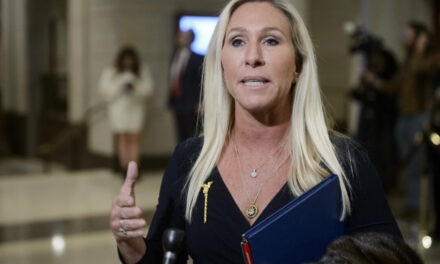We support our Publishers and Content Creators. You can view this story on their website by CLICKING HERE.
The massive bill includes disaster relief funding, pharmacy benefit management reforms, and a congressional pay raise.
Congress has only two days left to extend government funding beyond its Dec. 20 expiration date and sidestep a shutdown.
Rep. Thomas Massie (R-Ky.) was not one of those people.
“People call me ‘NostraThomas’ for accurately predicting @SpeakerJohnson would use the Christmas recess to force a massive spending bill through Congress,” Massie noted in a social media post on X.
“After claiming he would not, Johnson is embracing a DC tradition that’s nearly as old as decorating Christmas trees.”
When Johnson first took the gavel last year, one of his promises to his Republican colleagues was an end to governing via massive omnibus spending bills.
The bill extends current funding levels through March 14 and adds funds for disaster relief, farmers, a congressional pay raise, and other matters.
The measure also incorporates sweeping reforms for pharmacy benefit managers, the middlemen who negotiate drug prices.
Here’s a breakdown of a few of the bill’s major provisions:
Disaster Relief
Disaster assistance was a focal point of spending negotiations in recent weeks, with many in the Southeast still recovering from Hurricanes Helene and Milton.
The spending bill honors that figure, allocating roughly $100 billion in disaster aid. That includes $29 billion for the Federal Emergency Management Agency’s Disaster Relief Fund, $21 billion for aid to farmers hit by disaster-related losses, and another $10 billion in economic assistance for farmers.
Farm Bill Extension
The spending deal extends for another year the authorization of the 2018 farm bill, which funds various programs and assistance for farmers.
The provision was included after lawmakers failed to pass a longer reauthorization of the package upon its expiration last year. The new authorization will expire at the end of fiscal year 2025.
Reining in Drug Middlemen
Pharmacy benefit managers, or PBMs, are the intermediaries who negotiate drug prices with manufacturers on behalf of health insurance companies. They decide which drugs will be covered by health plans and process and pay drug claims.
For years, lawmakers have sought to enact reforms surrounding these middlemen’s practices, which some say have artificially inflated prescription drug prices.
The stopgap spending bill would require PBMs to submit detailed reports to health insurers regarding the prices they negotiate and any rebates, fees, or discounts they receive. The rebates would also need to be passed on to the health plan or insurance issuer.
The provisions would change the payment model through which Medicaid compensates PBMs to a flat fee. The bill also bans the practice of spread pricing, through which PBMs pocket the difference between what they pay pharmacies for drugs and what they charge Medicaid.
Baltimore Bridge Replacement
The bill also commits the federal government to cover the full cost of rebuilding Baltimore’s Francis Scott Key Bridge.
It is not yet known how much the entire project will cost, though an estimate from the Maryland Transportation Authority places the price tag between $1.7 billion and $1.9 billion.
The bridge collapsed in March after a cargo ship struck one of its supporting pillars. The incident resulted in the death of six construction workers.
Deepfake Porn Ban
Another noteworthy inclusion is the TAKE IT DOWN Act, which passed the Senate unanimously earlier this month.
The bill would criminalize the disclosure of nonconsensual pornographic material, including the publication of pornographic images featuring an identifiable person created through artificial intelligence.
The measure’s broad, bipartisan support could boost the spending bill’s chances of passage.
“This work is about building a future, about taking on the challenges of the new environment we live in, and not just pretending it’s not happening anymore,” Sen. Amy Klobuchar (D-Minn.), one of the bill’s sponsors, said at a Dec. 11 press conference.
“Fewer Americans will have their lives turned upside down if we can get this done, fewer children will have their innocence snatched away from them, and more victims can seek justice that they deserve.”
Pay and Benefits Increases
A notable exclusion from the stopgap bill is language blocking a cost-of-living adjustment, or COLA, wage increase for members of Congress.
Since 2009, the base salary for federal lawmakers has been $174,000. Every year since, funding bills have included language preventing members of Congress from receiving annual pay raises.
The continuing resolution would also remove an existing requirement that members of Congress obtain their health insurance from the Affordable Care Act marketplace.
The change would allow lawmakers to return to the Federal Employee Health Benefits program, which is widely considered to be a better plan with more benefits. Congressional staffers would still be required to obtain their insurance from the ACA marketplace.
Rep. Jared Golden (D-Maine), a vocal critic of efforts to increase congressional compensation, slammed the move to sneak those changes into the continuing resolution.
“We should be working to raise Americans’ wages and lower their health care costs, not slipping new taxpayer-funded perks for ourselves into must-pass legislation behind closed doors. As long as raises and new health care perks for members are in the CR, I will vote against it,” Golden wrote on X.
Reuters contributed to this report.

 Conservative
Conservative  Search
Search Trending
Trending Current News
Current News 







